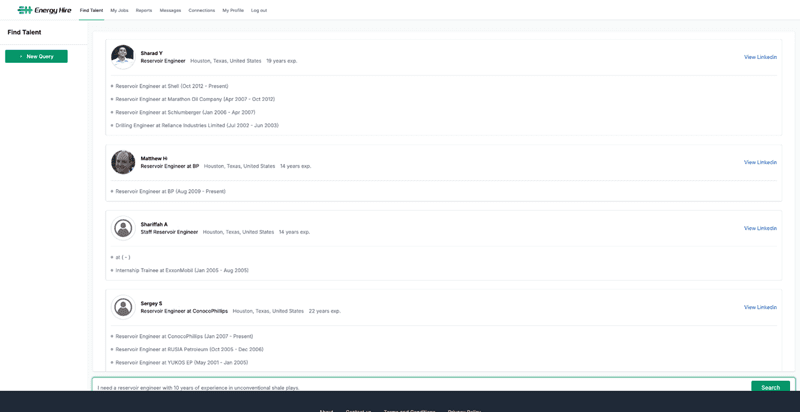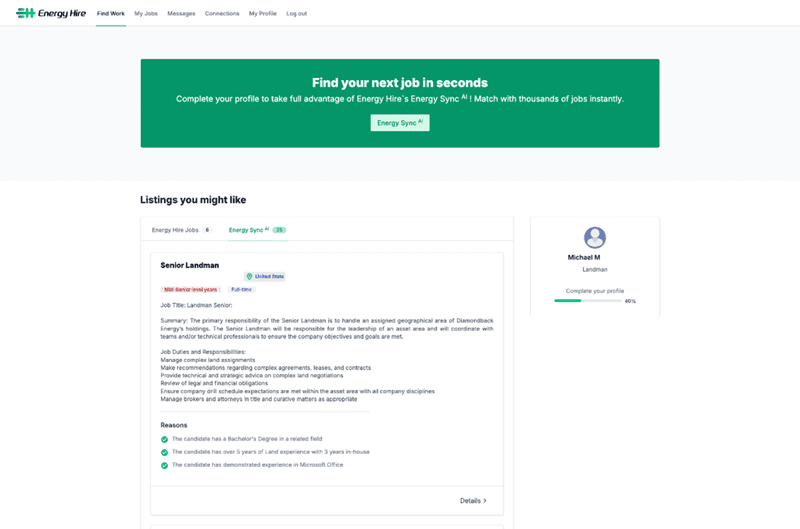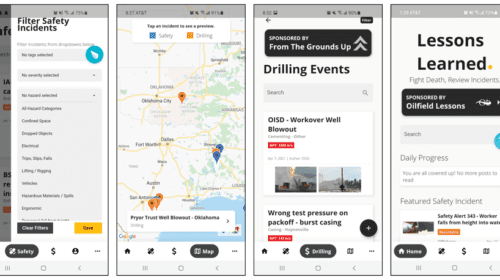While the thought of a career change often elicits excitement, pinpointing that next opportunity can be daunting. The pains and struggles associated with completing multiple online applications and seemingly repeating data found on one’s resume can bring discouragement. If more is needed, additional struggle typically comes with identifying that perfect career, often due to an elementary keyword search or a platform that fails to serve the energy sector properly.
Using artificial intelligence (AI) and a specific approach, Energy Hire focuses on the historical shortcomings of the job search and offers a solution that revolutionizes how it is conducted, where it takes place, and how it is successfully managed. While platforms such as Indeed and Career Builder support multiple industries, Energy Hire streamlines the process and concentrates specifically on the energy industry alone.
“We are very specific [about] who we target, and we believe that is an underserved market,” says Michael McCown, chief executive officer for Energy Hire. “We have a better understanding of the needs of the energy sector.”
The basic premise of Energy Hire is to serve as a platform to secure employment in the energy sector. The platform offered allows the user two different vantage points associated with career placement. Energy Hire serves career seekers and companies attempting to staff various positions and roles.
A company seeking to hire individuals can utilize the Energy Hire platform to post singular positions or multiple offerings. Companies can contract with Energy Hire to host these vacant positions and use AI customization abilities to match those opportunities directly with individuals searching for employment. Contracting this service and harnessing the AI capability allows the job poster to connect with new career seekers already utilizing the platform.
“The advantage is that the job posters now have the ability to fish a loaded pond,” says McCown.
Identifying the right candidate can be a challenge for companies attempting to hire new professionals. McCown justifies the cost associated with an Energy Hire membership by comparing it to the costs associated with utilizing the services of staffing agencies.
“Headhunters cost a lot of money, and sometimes the candidate does not work out, but the recruiter still has to get paid. In the end, a great deal of money was invested in someone that only lasted just a few weeks or months.”
According to McCown, paid subscribers find additional benefits in the application process itself. While some potential candidates bypass online applications due to repetitive and dreaded data entry processes, job posters under contract enjoy the provisions directed at the process itself. By paying the subscription fee to post open job descriptions directly on the Energy Hire platform, companies are more likely to get a more robust response from candidates.
“For our paying customers, applicants apply directly on our website,” says McCown. “The benefit is applicants do not have to fill out multiple applications. Resumes can be parsed when those career seeker profiles are built.”
While Energy Hire remains in its infancy, McCown says it is conducting beta testing on its paid subscription side of the platform. He indicates that his team is collecting data and feedback from subscribers to learn how the service can be improved in any fashion to provide additional benefits.

“The top priority was making it where the employer could search our candidate database and use AI tools based off job descriptions and also job seekers to use AI for free to match to jobs refreshed on a weekly basis,” McCown explains.
Career seekers or individuals looking for new roles can navigate the Energy Hire platform to search for those positions being offered. The searchable positions, however, come from more than just the roles posted by paid subscribers. Energy Hire’s AI technology allows the platform to provide job postings taken directly from a company’s website. Energy Hire only shows that job offering and directs the seeker to the poster’s website, where they dictate the application process.
Those searching Energy Hire for new job opportunities can build a profile and use the platform’s custom AI tools to match that profile to approximately 7,000 to 8,000 available jobs, considering the listed skills applicable. McCown says this database of jobs refreshes on a weekly basis. As a result, career seekers find confidence in knowing they are applying for actual available jobs rather than posts that have long expired.
The additional benefit to searching the Energy Hire platform for a new role is the ability to be specific to the position sought. Because Energy Hire represents the energy industry and utilizes AI, career seekers can zero in on a particular role. While traditional career platforms cater to more popular and abundant positions like drillers or chemical engineers when serving the energy sector, Energy Hire allows users to search all available white and blue-collar roles.
“So, if you are a reservoir engineer with ten years of experience, and you are looking for a more senior role, you click a button, and it takes you to opportunities directly on the job poster’s website, whether or not they are an Energy Hire client,” McCown explains.
Here, the AI technology enables the user to benefit from the ability to be more specific. While job searches typically result in many potential selections, many genuinely have no bearing on the career search at hand. Energy Hire’s AI use allows the user to drill down and be specific, eliminating job posts deemed not applicable, but AI’s input does not stop there.
After building that profile and searching the heavily populated database of opportunities, AI can guide the user in finding the proper job position. AI technology provides suggestions as to which jobs to apply for based on the information found in the user’s profile and suggests reasons for applying for the role. This technology makes the job search and application process more efficient while instilling a level of confidence not normally harnessed when navigating the job search endeavor.
McCown envisions a bright future for the energy industry, with Energy Hire playing a leading role in supporting its growth. As needs change, McCown indicates the Energy Hire technology can be upgraded to support career placement as the industry expands.
“We’re trying to provide a meaningful way of filling all these specialized careers parallel with the energy transition,” says McCown.
To fully support career seekers and hiring companies, McCown plans to continue offering the best support possible in staffing the industry. He says that one critical component will be creating relationships with trade organizations to offer a suite of support services. While other sites offer outsourced content rooted in news sites, McCown sees immense potential in offering custom content that both informs and supports the career placement process.
“Energy Hire is the premier solution in staffing the energy industry’s future,” states McCown. “We offer an effective method for finding meaningful roles while cutting through the chatter and noise of sites like LinkedIn and Indeed.”
To learn more, go to Energy Hire.
Featured photo: From a job seeker’s perspective, you create a profile, and AI will build it for you with your resume. You can then click one button, and it will instantly match our job database.
Nick Vaccaro is a freelance writer and photographer. In addition to providing technical writing services, he is an HSE consultant in the oil and gas industry with twelve years of experience. Vaccaro also contributes to SHALE Oil and Gas Business Magazine, American Oil and Gas Investor, Oil and Gas Investor, Energies Magazine and Louisiana Sportsman Magazine. He has a BA in photojournalism from Loyola University and resides in the New Orleans area. Vaccaro can be reached at 985-966-0957 or nav@vaccarogroupllc.com.
Oil and gas operations are commonly found in remote locations far from company headquarters. Now, it's possible to monitor pump operations, collate and analyze seismic data, and track employees around the world from almost anywhere. Whether employees are in the office or in the field, the internet and related applications enable a greater multidirectional flow of information – and control – than ever before.













